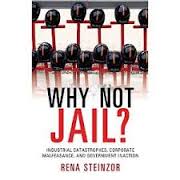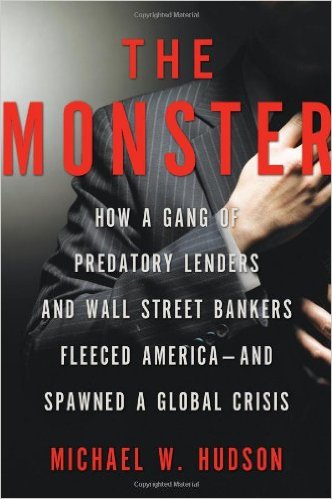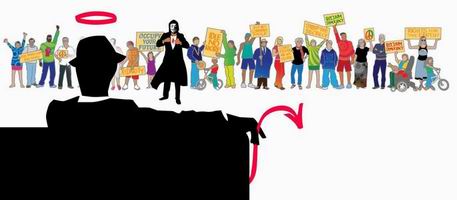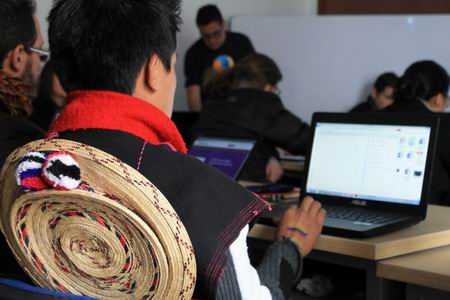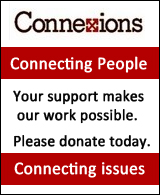Other Voices: The Connexions Newsletter
April 9, 2016
This Issue: Corporate Crime
Corporations first emerged as a form of legal partnership which allowed a number of investors to pool their capital to establish joint ventures. At the same time, incorporating limited companies allowed investors to limit their risk and their liability. Shareholders could shield themselves and their assets from liability if the venture failed or incurred debts, or if the corporation broke the law.
In the last century, corporations have been able to acquire tremendous power, including the power to make governments write laws and sign treaties to serve the interests of companies and their owners.
At the same time, corporations have increasingly become legally unaccountable for their behaviour. Yet all too often corporations break the law and engage in criminals acts which would be severely punished if they were committed by ordinary individuals. These illegal acts range from deliberate health and safety violations that cost lives, to land seizures, to environmental negligence that contaminates lands and waters. Most of these illegal acts are never prosecuted, and those that are, are usually dealt with by a fine that corporations can treat as a cost of doing business.
There are movements demanding that corporations be held accountable for their crimes in a serious way, and, specifically, that corporate executives should face jail time when the corporation they are in charge of engage in behaviour that causes death, injury, and illness.
Our topic of the week for this issue of Other Voices is Corporate Crime, and a number articles, as well as a book, a film, and a website, explore aspects of the problem.
In the Organizing section, we feature an article about the use of petitions in grassroots organizing. In People's History, we look at the use of new digital technologies in work to preserve indigenous languages.
As always, we invite you to share this newsletter with your friends. You can forward this email, or send them the link to the Other Voices home page on the Connexions website at www.connexions.org/Media/CxNewsletter.htm.
If you'd like to subscribe and receive this newsletter by email every two weeks, please use this form.
Your feedback is appreciated - and so are donations to keep us doing what we're doing!

Topic of the Week
Corporate Crime
The Connexions Subject Index features an extensive collection of articles, books, websites, films, and other resources on Corporate Crime. Find them here.
This Week on Connexions.org
The Case for Jailing Corporate Executives
Makes the case that when corporations commit serious crimes, their executives should be jailed. The crimes committed by corporations, such as recent cases involving automobile manufacturers VW, Takata, and General Motors, are often extremely serious, resulting in death and illness. Why are the perpetrators allowed to get off simply by writing a cheque to cover a fine, instead of going to jail the way other criminals do? Read more
Keywords: Corporate Accountability - Corporate Crime
Romania's 'occupy forests' movement demands clampdown on corporate crime
A growing protest movement is demanding strong controls on international investors and logging companies buying up Romania's forests. In its sights is Austria-based Schweighofer, which stands accused of criminal malpractice and accepting illegal timber shipments. The popular outrage stirred up by corporate misdeeds is stimulating a wider democratic revival. Read more
Keywords: Corruption - Forests
An Idiot’s Guide to Prosecuting Corporate Fraud
A group called Bank Whistleblowers United have just pushed out a comprehensive plan they think would put the U.S. government back in the business of identifying, indicting, and convicting financial fraudsters -- restoring accountability while protecting the public. Read more
Keywords: Corporate Crime - Corporate Fraud
In the footsteps of Gandhi: An interview with Vandana Shiva
Vandana Shiva is a scientist, a campaigner on green issues and anti-globalization, as well as an admirer of Mohandas Ghandi. In this interview, she discusses how her studies in science led her to be an outspoken voice on such crucial environmental issues as seed legacy, biopiracy and economic injustice. Read more
Keywords: Rural Women - Science
Misrepresenting the White Working Class: What the Narrating Class Gets Wrong
Most of the time the white working class is invisible in the United States. But during elections there is a flurry of attention to this “demographic” among political reporters and operatives. At these times, the prejudice of middle-class professionals becomes apparent in their scorn for working-class people. For example, commentators take it for granted that the strongest support for Donald Trump comes from white workers. When you look at the figures, however, it is clear that the white working-class is in fact under-represented among Trump supporters relative to its share of the population, whereas college-educated whites disproportionately support Trump, relative to their share of the population. Read more
Keywords: Stereotyping - Working Class
Website of the Week
Corporate Watch
Corporate Watch is a British-based not-for-profit co-operative which provides critical information on the social and environmental impacts of corporations and capitalism. Their current priority areas are climate change and ecology, militarism and social control, democracy, privatisation and housing. Corporate Watch’s guiding principles include anti-capitalism, anti-authoritarianism, anti-oppression, ecological values, a transnational orientation, and change from below. All of its work is available for free on the website. Learn more
Keywords: Corporate Accountability - Transnational Corporations
Book of the Week
The Monster: How a Gang of Predatory Lenders and Wall Street Bankers Fleeced America -- and Spawned a Global Crisis
By Michael Hudson
Michael Hudson explains the rise and fall of the subprime mortgage business by chronicling the rise and fall of two corporate empires: Ameriquest and Lehman Brothers, who did more than any other institutions to create the feeding frenzy that flooded the U.S. with high-risk, high-profit home mortgage loans. Read more
Keywords: Commercial Crime - Fraud
Video of the Week
The Corporation
A film by Mark Achbar, Jennifer Abbot, and Joel Bakan. The Corporation explores the nature and spectacular rise of the dominant institution of our time. See more
Keywords: Corporate Ethics - Corporations
Organizing
Marxism and the Petition
Many petitions operate only on the reformist appeal to authority (this is especially true of the many online petitions from sites like Change.org), which fits perfectly within the liberal democratic framework. But the petition can operate on more than one level. Its dual nature means that it is often an indispensable tool in building collective power for more radical ends. Read more
Keywords: Grassroots Campaigns - Petitions
People's History
First Steps of Participatory Research Project: Indigenous Languages and Digital Media
The rapid development of digital media, which began during the last decade of the 20th century, has had unanticipated effects at the beginning of the 21st century. Peoples, whose cultures and languages were marginalized and displaced by the Nation-State, have appropriated -- slowly, but surely -- these media to reassert their cultural and linguistic presence in cyberspace. Read more
Keywords: Aboriginal Language Preservation - Aboriginal Languages
From the Archives
Save the Lukács Archive
The Hungarian government is threatening to close the Georg Lukács Archive. Lukács was a writer and intellectual whose work spanned the period from around 1910 to his death in 1971. Few thinkers were marked so deeply by the changing nature of the periods in which they wrote. To possess an archive of such a career is of immense value to all who seek to understand the 20th century.
Keywords: Destruction of Libraries and Archives - History/Archives
Turn on tune in - hippie photos unseen for decades
Discovered in the basement of the San Francisco Chronicle: images from San Francisco and the Bay area from the heyday of the 1960s hippie era. See them here
Keywords: Hippies - Photography Archives
Connexions Calendar
April 11, 2016 – Ottawa, ON
Jane Goodall: Journey from the Jungle
Join Dr. Jane Goodall as she takes you on a journey through the forests of Gombe where her groundbreaking research on chimpanzees helped her become a household name. Dr. Goodall first set foot in the forests of Tanzania in 1960, armed with little more than a notepad, a pair of binoculars and a dream of observing wildlife. Dr. Goodall will share tales from the moment she witnessed a chimpanzee make a tool to the moment she decided to leave the park in order to save the chimpanzees she cared for.
April 11, 2016 – Sharon, ON
Open Sesame: The Story of Seeds (film)
One of the world’s most precious resources is at risk. This timely and emotionally moving documentary illuminates what is at stake and what can be done to protect the source of nearly all our food: SEEDS.
April 14 - 18, 2016 - Washington, DC
SOA Watch Spring Days of Action
Join us this Spring for protest, music, grassroots lobbying, and to welcome the Peace, Life, and Justice Caravan when it arrives in Washington DC after traveling through Honduras, El Salvador, Guatemala, Mexico, and the U.S./Mexico border to raise awareness of the immense harm caused by the endless Drug War.
April 22, 2016
International Mother Earth Day
International Mother Earth Day promotes a view of the Earth as the entity that sustains all living things found in nature. It honours the Earth as a whole and our place within it.
April 29 - May 1, 2016 – Tobermory, ON
Peoples of the Great Arc – Two Ways of Knowing
The topic for Forum 2016 is part of a series of explorations on the human history of the Bruce Peninsula and the Niagara Escarpment (the Great Arc as it extends through Ontario, Michigan and Wisconsin). Field trips, workshops, presentations and speakers will focus on the human development of the area following the last ice ages until European settlement. Evidence will come from archaeological findings and First Nations traditional knowledge.
The Connexions Calendar is an online calendar that exists to advertise events that support social justice, democracy, human rights, ecology, and other causes. We invite you to use it to promote your events. Adding events to the Connexions Calendar is FREE. We'll give you a username and password which you use to log on. Use the contact form to arrange for a username and password. Read more →
Seeds of Fire
April 9 - 15, 1834
Canut (silkworkers’) revolt
Faced with employers conspiring together to reduce their wages, coupled with arrests of workers who try to resist, thousands of silkworkers in Lyon, France, rebel. The army moves in and opens fire on an unarmed crowd. In response, barricades are thrown up, workers seize weapons from the armouries, and street fighting begins. The uprising continues until April 15, when the army succeeds in imposing order, which it does by killing hundreds of workers and imprisoning more than 10,000 others.
April 9, 1948
El Bogotazo
Riots break out in Bogota, Colombia, after the assassination of the Liberal presidential candidate Jorge Eliécer Gaitán. The riots leave 3,000 to 5,000 people dead. The fighting marks the beginning of a ten-year period of civil war known as La Violencia, in which more than 200,000 die.
April 11, 1972
Common Front Strikes in Quebec
Over 200,000 public sector workers go on strike against the government, and Quebec grinds to a halt. The workers’ demands include a pay increase to match inflation, a say in working conditions, and equal pay for equal work. The Quebec government tries to break the strike with injunctions, arrests, huge fines imposed on striking workers, and finally back-to-work legislation, imposed on April 21. When the striking workers go back to work after April 21, the government sets out to teach them a lesson, and jails the leaders of the big three union federations. Within hours, workers walk off the job again, and this time the strikes spread far beyond the public sector, turning into a general strike with more than 300,000 workers off the job. Workers seize control of 22 radio stations, and force anti-union capitalist newspapers to stop publishing. In the end, the government agrees to free the jailed union leaders, and the workers agree to return to work.
April 12, 1838
Rebels hanged in Toronto
Samuel Lount and Peter Matthews, two men who participated in the Upper Canada rebellion in 1837, are hanged in Toronto. In the months he spends in the Toronto Gaol awaiting execution, Lount keeps up the morale of the other rebel prisoners by defending the cause they fought for. On his way to the gallows, he tells the other prisoners "We die in a good cause: Canada will yet be free."
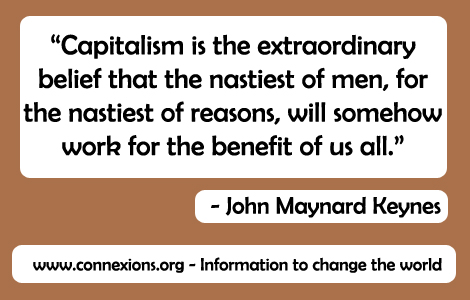
Your support is needed to keep Connexions going
All of the work of the Connexions project is done by volunteers, but our expenses include rent, phone and computer costs and technical support, as well as expenses related to our ongoing project of converting printed archival materials into digital formats. You can make a one time or regular monthly contribution through the donate page on the Connexions website.
Bequests
Many of us have made working for social justice a lifetime commitment. If you are thinking about leaving a legacy for social justice that will live on, you might want to consider leaving a bequest to Connexions in your will. If you'd like to discuss this option, please contact us or see the Bequest page.


